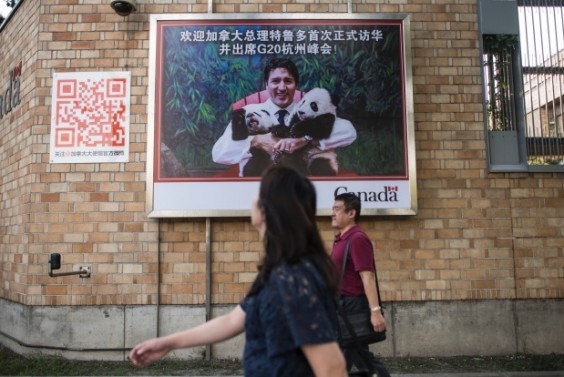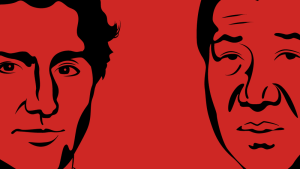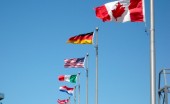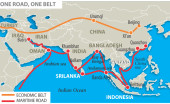Re Ian Bremmer 'Could third-party candidates upend the 2024 US election?' 3 April The current political movement in the USA…
PM Trudeau China visit 2016
Written by Diana Thebaud Nicholson // September 4, 2016 // Canada, Foreign Policy // 1 Comment
Trudeau pushing free trade deal with EU at G20 summit in China
China also warns protectionism puts global economy at risk
With the two-day summit taking place after Britain’s vote in June to exit the European Union and before the U.S. presidential election in November, observers expect G20 leaders to mount a defence of free trade and globalization and warn against isolationism.
Prime Minister Justin Trudeau himself was expected to discuss the subject when he met with European leaders on the margins of the G20 leaders’ summit in China, International Trade Minister Chrystia Freeland said.
Freeland, who is also in Hangzhou, noted that growing movements against trade liberalization have complicated always-delicate talks with the United States on softwood lumber.
These attitudes, she added, have also affected Canada’s push to sign a free trade deal with the European Union, also known as CETA.
“The prime minister is using his time here — it’s very valuable, lots of European countries [are] of course members of the G20 — to push for CETA to get it over the finish line,” said Freeland.

Free trade with China won’t work for Canada
By Gwyn Morgan
The natural resources we sell them already move without tariffs, and removing barriers on manufactured goods would put our manufacturers at an even greater disadvantage
Message to Mr. Trudeau: Please use your exceptional relationship-building skills to warm relations with China. But studiously avoid any signals that free trade will ever be part of that relationship.
[See Comment Well made China may not break easily, but China breaks agreements with ease below]
Trudeau In China: Prime Minister Takes Hard Stance Against ‘Divisive, Fearful Rhetoric’ At G20
(CP) The prime minister pointed to slowing global economic growth as a source of the anxiety behind the movements. He noted how it has surfaced in the Brexit debates in the United Kingdom and in election campaigns, an apparent reference to the United States.
Trudeau’s message was driven by one of Canada’s goals at the gathering in the Chinese city of Hangzhou: encouraging countries to beat back the growing sentiment that trade is bad.
3 September
Speaking ahead of G20, Justin Trudeau urges leaders to fight protectionism
‘We know that isolationism, that building walls, that closing in on oneself does not create opportunity’
(CBC) In his first event at the G20 leaders’ summit, Justin Trudeau urged his peers Saturday to drive away the anti-globalization and protectionist attitudes that have been fuelling “divisive, fearful rhetoric” in different parts of the world.
The prime minister pointed to slowing global economic growth as a source of the anxiety behind the movements. He noted how it has surfaced in the Brexit debates in the United Kingdom and in election campaigns, an apparent reference to the United States.
Can I see your passport? Behind the scenes with Canada’s delegation in China
Trudeau’s China visit: Media navigate unfamiliar sea of protocol
Strange moments from the road during Prime Minister Justin Trudeau’s 10-day trip to China
Alibaba’s new online hub to help Canadian firms access huge Chinese market
Trudeau’s message was driven by one of Canada’s goals at the gathering in the Chinese city of Hangzhou: encouraging countries to beat back the growing sentiment that trade is bad.
2 September
Trudeau in China: Take note of Asian models that leverage, value scientific research
By Keith W. Hipel, Senior Fellow, Centre for International Governance Innovation
(Open Canada) In both Japan and China, strong links exist between national academies and government, and research is well funded. Canada should take note.
Some questions worth thinking about for the Canadian government, considering Prime Minister Justin Trudeau’s current trip to Asia: Would it like some of the best experts in the world to design a sensible industrial strategy for Canada that would guarantee long-term wealth, employment and economic security for generations to come? Would it like to harness the brain power of our best thinkers to determine how Canada could secure a nutritious food supply system in the face of climate change and international trade agreements? Would it be surprised to learn that this could all be done at little cost and with no payment to the experts?
In fact, Canada’s best intellectuals, many of whom are fellows of our various National Academies embracing the social, natural and health sciences, as well as engineering, are here to serve the country and its government. The only requirement is for Canada to ask them to tackle a problem of national concern and to cover basic expenses involving support staff and travel, with no additional salaries going to the experts.
… these fountains of knowledge are not being effectively utilized to benefit Canadians economically, socially and culturally because of two main reasons: the lack of strong links between our National Academies and government, and the dearth of funding to support expert panels to address problems of national concern. And, despite a change of government, this continues to be a challenge in Canada.
To explain how to take advantage of the intellectual wealth of a nation for the benefit of all consider the cases of Japan and China.
Should Canada join China’s new bank?
(Globe & Mail editorial) On Wednesday, Canada announced that, before the end of this year, it will apply to join the Chinese-founded, Chinese-led and Chinese-headquartered Asian Infrastructure Investment Bank, or AIIB. The Communist Party-run Global Times newspaper described bringing Canada on board as a “political coup.” And that it is.
When Beijing unveiled the idea of the AIIB a few years ago, it was met with suspicion and hostility in many capitals. The world already has an equivalent institution: the World Bank. What’s more, Asia has long had its own regional version, known as the Asian Development Bank (ADB). The sense that China was trying to sideline two long-standing and pro-Western organizations meant that no G7 countries agreed to join the Chinese-led AIIB.
But that unified front quickly crumbled. Britain, angling for better relations with China and benefits for its financial sector, last year surprised everyone by announcing it wanted to become a member. The floodgates opened, and most major and minor European and Asian countries are now on board. The last major hold-outs are Canada, Japan and the U.S.
The concern is that this is going to be an organization run and led by China, for China. There is also a worry that this is a precedent: Instead of being restrained by existing international institutions, China is taking steps to build competing structures of global governance that it can dominate. … given that the AIIB is alive and kicking, and with so many other countries already having signed on, there’s no reason for Canada to remain on the outside. Under the circumstances, joining is the right call. Better to work within this new bank than stand aloof from it.
And so far, the AIIB appears eager to co-operate with the World Bank and the ADB. If the various democratic members of the AIIB, such as Canada, can push for proper oversight and good governance, it could turn into something more than just a vehicle for Beijing’s economic and foreign policy interests.
Justin Trudeau uses business speech in China to focus on human rights
Prime minister delivered speech to Canada-China Business Council in Shanghai
Prime Minister Justin Trudeau says he raised the issue of freedom of expression and the importance of diversity in his meetings this week with Chinese President Xi Jinping, and encouraged him to do more to protect human rights.
China, Canada firms sign 56 deals worth more than $1.2B
Canada to open seven new visa centres in China to attract more tourists
Chinese premier Li Keqiang said at a meeting with Canadian Prime Minister Justin Trudeau on Wednesday that both countries had agreed to start feasibility talks on a free trade pact at an early date.
The deals signed on Thursday involve companies in sectors from seafood to clean technologies, the trade minister said ahead of a speech by Trudeau.
30 August
Trudeau in China: PM offers to help Beijing reshape its role on the world stage
(Globe & Mail) Mr. Trudeau said China should strengthen its connection to Canada as a way for the rapidly growing superpower to burnish its image on the world stage and that he intends to make real progress on a renewed relationship between the two countries
Justin Trudeau suggests China improve its image by tightening ties with Canada
PM says Canada looking ‘very favourably’ at joining Chinese-backed Asian Infrastructure Investment Bank
China’s oil sands woes risk becoming another irritant on Trudeau’s official visit
(BNN) Human rights issues and Chinese backlash to the foreign homebuyer tax in Vancouver may be dominating discussions ahead of Prime Minister Justin Trudeau’s first official visit to China.
However, experts say if Canada wants to make economic progress with the world’s largest economy, Trudeau must focus on far less headline-grabbing issues.
Here’s a look at the most significant challenges that Trudeau faces, and what’s at stake for Canada as the prime minister seeks to strengthen ties with China.
While many Chinese nationals are feeling angry about the extra 15 per cent tax they now must pay on property they buy in Vancouver, Gordon Houlden [director of the University of Alberta’s China Institute who previously served as a Canadian diplomat in Beijing] believes the Chinese government does not necessarily share the same level of concern as its citizens.
China is set to impose tougher inspection standards on imports of Canadian canola as of Sept. 1, just as the Prime Minister’s visit enters full swing. “I would argue this is a keystone issue that will take up a major chunk of time,” Houlden said.
China is attempting to limit the spread of blackleg crop disease, which it believes to be an issue unique to Canadian canola despite the industry maintaining the claim is not scientifically justified. Canada is the world’s largest canola producer and roughly 40 per cent of the crop – used primary to make vegetable oil – is sent to China for proceeds of roughly $2 billion annually.
Energy & tar sands
Chinese government-backed cash was very recently king in the Canadian oil patch. No longer: Chinese capital made up nine per cent of Canada’s total foreign direct investment in energy assets by 2013, up from less than one per cent in 2004. However, since then, the trend has reversed.
Many have pointed to the restrictions former Prime Minister Stephen Harper placed on state-owned enterprise (SOE) investments specific to the oil sands after approving the massive $15-billion sale of Nexen to CNOOC in late 2012.
Another explanation, according to Houlden, has to do with the low quality of Nexen’s flagship Long Lake oil sands asset; which has been constantly beset by issues ranging from a massive pipeline spill to a deadly explosion that forced the facility to shut down indefinitely earlier this year. CNOOC posted its first-ever half-year loss on Wednesday, which the company blamed specifically on its Canadian oil sands assets. And, earlier this year, CNOOC blamed a lack of new pipelines to the Pacific for its pullback on investment.
Intellectual property rights
Unlike Canada, the United States and Europe, Chinese law offers comparably weak protections for owners of various patents and copyrights, and according to Prof. Ondrack, lack of progress on that file is preventing Canadian businesses from operating there.
Before meaningful progress can be made towards anything even remotely resembling a Canada-China free trade deal, Trudeau has already insisted China must achieve progress on its human rights record first.
Houlden also expressed practical concerns about what “progress” actually meant in real terms: “How would you gauge it, how would you measure it? The idea that you can dictate terms to a country as big as China in 2016, those days are long gone.”
29 August
Trudeau visits China: 6 things to watch
(CBC) As Prime Minister Justin Trudeau departs for his first official visit to China, Canada’s second-largest trading partner, here are six things to watch.
How warm a welcome?; Progress on a free trade deal?; Canadian investment in Asian infrastructure; Human rights and global security; Canada and the G20; Reasonable expectations
27 August
 Eastern promises
Eastern promises
About to visit China for the first time as Prime Minister, Justin Trudeau can certainly expect a warm welcome, but he would like to come away with a lot more. Daniel Leblanc reports
… sources have told The Globe and Mail that there will be “no movement” toward a free-trade deal with China. Federal officials say the Canadian public is skeptical about China’s willingness to embrace the rule of law and transparency in business dealings, and it remains to be seen how the Chinese react to Mr. Trudeau’s calls for the respect of human rights during his trip, however forceful he makes it.
The key signing is expected to be a deal guaranteeing annual meetings between Chinese and Canadian leaders, including regular bilateral visits. This will be Mr. Trudeau’s fourth visit to China, but certainly not his last.
26 August
In search of a winning China strategy
John Bruk, Founding Chairman, Asia-Pacific Foundation of Canada, lists three issues that should be top of mind during Trudeau’s upcoming China visit.
(Open Canada) Canada’s housing crunch, its increasing trade deficit and foreign state investment in its core assets are the issues Trudeau should keep front of mind as he travels to China next week for an official visit and the G20 Leaders’ Summit.
Trudeau has an opportunity to affirm his government’s commitment to resolving the housing crisis by establishing emergency measures with the premiers and mayors of impacted jurisdictions. Measures should include restricting foreign purchasers to new housing, requiring resident foreigners to prove sufficient Canadian taxable income to qualify for mortgage loans and ensuring unoccupied homes meet neighbourhood standards. Once the federal working group reports back, the three levels of government should replace the emergency measures with regulations.
While we await positive government action, rich Chinese immigrants will continue to bid for our best housing and commercial real-estate, our best known companies and our core assets. And who can blame them, considering we have bought over CAD$400 billion of goods more from China than we have sold to China, since it resurged as an economic power. This $400 billion gives them plenty of money to continue acquiring our best assets. This would not be happening if we had a better trade policy with Asia.
Canada should consider a new approach to trade and investment. It could invite foreigners to invest in processing raw materials in Canada. Call it the “Fourth Option.” This would increase the value of its exports and reduce the deficit. Joint ventures with Canada’s energy companies to build facilities for processing its bitumen would provide China’s investors with excellent opportunities, while reducing China’s energy import requirements, as the processing plants would be built in Canada. And China would have assured supplies of derivative products, such as petrochemicals, reducing its need to pressure Canada to build a pipeline to the coast, which the majority of Canadians oppose.
During Harper’s tenure, state-owned Chinese companies bought over $40 billion of some of Canada’s best energy assets. This trend must be stopped. We need to protect our core assets and develop a better China investment strategy. … If China is allowed to invest in Canadian Arctic regions, this becomes a very high stakes issue. …
Safeguarding Canadian ownership of our core assets — our natural resources, banks, insurance companies and airlines — is a higher priority than attracting investment capital and, in the long run, is even more important than the trade deficit with China. Selling Canada’s core assets rather than what they produce will diminish the sources of Canada’s profits and standard of living, and reduce opportunities for our children and grandchildren.
20 August
Jeremy Kinsman: Why Canada matters to China
Only Nixon could go to China — but only after Pierre Trudeau went first
(iPolitics) China is a country with great geopolitical and human relevance for Canada — which means we need a strategic partnership with it. Otherwise, we have no influence on it. Such a relationship doesn’t mute our voice on the inevitable disagreements; it lets us speak as candidly as we need to, and to be heard. You don’t get that from yelling through an ideological bullhorn.
Trudeau’s visit will end an arid decade in Canada-China relations. Our longest-standing ambassador, Howard Balloch, sees it as an opportunity to jump-start our dormant connections across the board. He believes the Chinese leadership sees the Harper period as an aberration. They prefer to remember not only Pierre Trudeau’s investment but also those of prime ministers Brian Mulroney and Jean Chretien, two men who built a relationship with China that extended beyond politics. Trudeau can use this trip to stage an across-the-board, country-to-country composite of activities engaging the private sector, the provinces, civil society, scholars and citizens.
Campbell Clark: Trudeau’s trip to China will be a diplomatic balancing act
(Globe & Mail) The Chinese want Canada to launch free-trade talks – and some in Mr. Trudeau’s inner circle think that’s a good idea. But many Canadians feel the Chinese regime is a bad actor, with a poor human-rights record and suspicious motives when it claims Asian islands or buys into Alberta oil-sands projects. That makes many more skeptical about a deal with big, powerful China.
So Mr. Trudeau has to balance some symbolism. The Chinese want signs that an era of warm ties is coming back after the cold-hot-cold inconsistency of Stephen Harper’s China policy. … They want some public signal that Canada is willing to explore free trade, at least some day. They want Mr. Trudeau to deliver symbols that he recognizes China is a big, important power – the PM’s agenda, five days in four cities even before the G20 summit opens in Hangzhou, is one. …
There are others watching, too, allies and East Asian nations that wonder if Ottawa, in a rush to expand trade, will ignore the other side of China’s rise, like its expansionist claims on maritime territory. One Asian diplomat expressed concern that Mr. Trudeau’s government might be populated by “panda-huggers.”
But Mr. Trudeau’s real challenge is the conflicting symbols the Chinese and Canadians expect. If he holds the panda too close, he might feel the political squeeze at home.




One Comment on "PM Trudeau China visit 2016"
Well made China may not break easily, but China breaks agreements with ease
It has been next to impossible to obtain fair treatment from the Chinese Government or from Chinese institutions. From time to time, I was called upon to counsel Canadian companies seeking to do business in China. After an early year or two of trial and error, my standard advice to my clients was “Don’t get into any agreements with the Chinese unless you have on your side a senior Chinese Government official who can clear a path for you”. All too often, Canadian companies would sign on with the Chinese Government, or a Chinese institution, or a Chinese state-owned company, only to be told later “The Chinese gent who signed the agreement lacked the authority to enter into it on behalf of the Chinese party”. And then there are the risks of cyberinsecurity and industrial espionage by the Chinese. And adverse court rulings by corrupt Chinese courts.